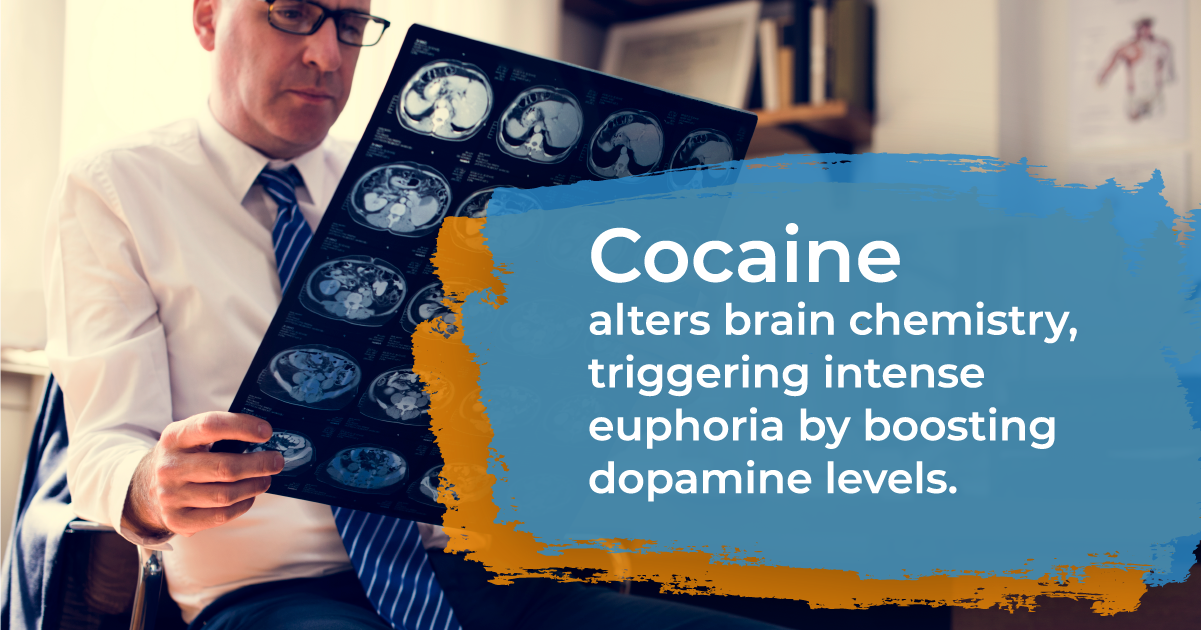What Cocaine Does to the Brain
Cocaine, a powerful stimulant derived from the coca plant, exerts a profound impact on the human brain, eliciting both immediate and long-term neurological effects.
Understanding the intricate interplay between cocaine and the brain is crucial for addressing the complex challenges associated with its use.
Key Takeaways
Cocaine use carries a risk of overdose, which can be fatal. Here’s what you need to know:
- Cocaine increases dopamine levels in the brain, creating intense feelings of pleasure and euphoria.
- Prolonged cocaine use can lead to structural changes in the brain, affecting areas related to decision-making and impulse control.
- Cocaine abuse can result in addiction and various mental health issues, impacting overall emotional well-being.
Contact The Recovery Team at (800) 817-1247 for holistic addiction recovery.
How Cocaine Works in the Brain
Cocaine is a highly addictive stimulant drug that affects the central nervous system. Cocaine interacts with neurotransmitters, the chemical messengers that transmit signals between nerve cells (neurons) in the brain.
The key neurotransmitters involved in the effects of cocaine include dopamine, serotonin, and norepinephrine.
Neurotransmitters
Neurotransmitters play a crucial role in regulating various physiological and psychological functions. They transmit signals across synapses, the gaps between neurons, allowing communication between nerve cells.
Cocaine exerts its effects by interfering with the normal functioning of neurotransmitters.
Dopamine
Cocaine primarily targets the dopamine system. Dopamine is associated with pleasure and reward, and cocaine increases the concentration of dopamine in the synapses by blocking its reuptake. Reuptake is the process of reabsorbing neurotransmitters by the neuron that released them.
Cocaine inhibits the reuptake of dopamine, leading to an accumulation of dopamine in the synapse and intensifying the pleasurable feelings associated with reward.
Serotonin
Serotonin is another neurotransmitter affected by cocaine, although to a lesser extent than dopamine. Cocaine disrupts serotonin reuptake, leading to increased serotonin levels in the synapses. This contributes to the mood-elevating and euphoric effects of the drug.
Norepinephrine
Norepinephrine, a neurotransmitter involved in arousal and the “fight or flight” response, is also influenced by cocaine. Similar to dopamine and serotonin, cocaine inhibits the reuptake of norepinephrine, leading to increased levels in the synapses.
This contributes to the stimulating and alerting effects of the drug.
How Cocaine Affects the Brain
Cocaine is a powerful stimulant drug that directly influences the central nervous system, exerting profound effects on the brain. Its impact is immediate and can lead to both short-term and long-term consequences.
Immediate Effects
Upon consumption, cocaine rapidly enters the bloodstream and crosses the blood-brain barrier. The immediate effects are intense euphoria, increased energy, and heightened alertness.
This is primarily achieved by blocking the reuptake of neurotransmitters in the brain, leading to their accumulation in the synapses.
Long-Term Effects on the Brain
While the immediate effects of cocaine are powerful, its long-term use can result in significant alterations to both the structure and function of the brain.
Here are some long-term effects of cocaine use:
Alteration of Structure and Function
Prolonged cocaine use has been linked to structural changes in the brain, particularly in areas associated with decision-making, impulse control, and emotion regulation. These changes can contribute to a loss of self-control and an increased susceptibility to impulsive behavior, further fueling the cycle of addiction.
Cognitive Impairments
Chronic cocaine use is associated with cognitive impairments, affecting processes such as attention, memory, and executive function. The drug’s impact on the prefrontal cortex, a region crucial for decision-making and impulse control, contributes to these cognitive deficits.
According to research or studies by The National Institute on Drug Abuse (NIDA), individuals who abuse crack cocaine may experience difficulties in learning, problem-solving, and maintaining attention over time.
Neurological Disorders
In addition to cognitive impairments, long-term cocaine use has been linked to the development of neurological disorders. Conditions such as movement disorders, seizures, and strokes have been reported in people with a history of chronic cocaine abuse.
Regularly small amounts of cocaine can lead to compromised blood flow, increasing the risk of these serious neurological complications.
Cocaine and Mental Health
Cocaine use can have significant effects on mental health, leading to various issues such as addiction, depression, anxiety, and disruptions in the dopamine system.
Here’s an overview:
Depression
- Temporary Euphoria: Cocaine use can initially result in feelings of euphoria, but the comedown may lead to depressive symptoms.
- Neurotransmitter Imbalance: Cocaine interferes with neurotransmitters, including serotonin, which plays a role in mood regulation.
- Withdrawal: Abrupt cessation of cocaine can lead to withdrawal symptoms, including depression.
Anxiety
- Acute Anxiety: Cocaine hydrochloride use can cause intense anxiety, paranoia, and panic attacks.
- Withdrawal Anxiety: During withdrawal, individuals may experience heightened anxiety.
Addiction
- Rewiring of the Brain: Cocaine alters the brain’s reward system, reinforcing compulsive drug-seeking behavior.
- Craving and Compulsion: Persistent craving and an inability to resist the urge to use characterize addiction.
- Loss of Control: Individuals may find it challenging to stop using cocaine despite negative consequences.
Cocaine Addiction
Adults facing cocaine addiction should seek cocaine addiction treatment from medical professionals. Treatment options often involve a combination of behavioral therapies, counseling, and, in some cases, medication. Addressing mental health concerns alongside substance use disorder is essential for comprehensive recovery.
Renew Your Life with The Recovery Team
Start your transformative journey to overcome cocaine addiction with the dedicated support of The Recovery Team.
Our comprehensive residential and intensive outpatient treatment programs are designed to empower you on your path to recovery. In addition, our Cognitive Behavioral Therapy (CBT) approach is tailored to address the root causes of addiction, providing you with the tools and support needed for lasting change.
Call us at (800) 817-1247 now and embrace the support you need for a brighter, addiction-free tomorrow.






